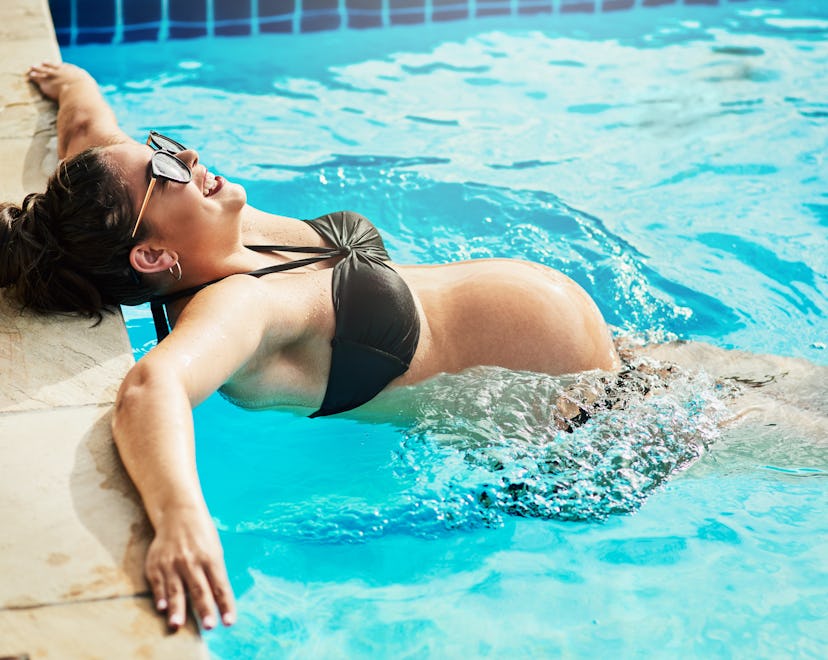Labor

Can Swimming Induce Labor? Experts Weigh In
Enjoy all that extra buoyancy.
When you’re super pregnant and the end is in sight, it’s pretty normal to want to not be pregnant anymore — especially in the summer months. There are few things worse than being super pregnant in the summer heat, but a pool helps. Even better is knowing if swimming can induce labor so you can evict your baby and avoid the sweltering weather. Why not take advantage, right? And even if you’re not close to your due date, nothing sounds better to your sore joints, and sweaty body than floating in a pool all summer long with a La Croix in your hand. Before you take a splash, here’s what you want to know about swimming during your third trimester.
Can swimming induce labor?
“While we do not completely understand all of the mechanisms involved in initiating labor, we do know that hormonal changes play a large role,” OB-GYN Dr. Idries Abdur-Rahman tells Romper in an email interview. Abdur-Rahman says that even strenuous exercises don’t work because they don’t change your hormone levels significantly enough — and swimming definitely doesn’t.
“The reduced gravity environment of the swimming pool, which reduces pressure on the cervix, may make labor onset even less likely in the short term,” Abdur-Rahman says.
So not only does it not help induce labor, but it can even prevent labor from continuing. But there are a lot of advantages to swimming throughout your pregnancy beyond keeping yourself cool.
Benefits of swimming while pregnant
While it may not get labor started, swimming is still super beneficial and safe for you. Patricia A. Evans, a nurse practitioner and certified midwife, tells Romper that swimming gives you relief from the heaviness from your uterus, and you’ll feel weightless from the buoyancy of the water. Other benefits to swimming while pregnant include relieving ankle and foot swelling, easing sciatic pain, reducing morning sickness, keeping you cool, and improving your endurance — which will help when it’s time to push the baby out. It can help you get better sleep — which is a feat in itself when pregnant. This is because swimming, though low impact, is an aerobic exercise, which is shown to help folks fall and stay asleep.
I don’t know about you, but I know even when I’m not pregnant I sleep a lot better after spending the day in the pool. I thought it was a combination of the sun and the chlorine, but obviously the exercise helped. Speaking of chlorine, is chlorine safe if you’re pregnant?
Chlorine & pregnancy
Don’t panic about the water itself — Evans says that chlorine in a swimming pool is safe for both mom and baby. “Chlorine serves a very important purpose in swimming pools — by keeping it as clean as possible — and swimming in non-chlorinated water would be significantly more dangerous,” Abdur-Rahman says.
Swimming in the third trimester
While swimming at all stages of pregnancy is perfectly safe, “you may want to stick to a pool or shallower water you can dip in versus the ocean as beach water tends to be more aggressive and can pose its own risks,” Dr. Jessica Shepherd M.D., chief medical officer at Verywell health and OB-GYN, tells Romper. She adds that diving, waterslides, or other activities like jet skiing or water rides at amusement parks should be avoided as well.
If you’re pretty close to labor time and your water breaks while you’re in a swimming pool, or if you want to jump in a pool after your water breaks to help those muscle contractions before delivering, that’s definitely not recommended. “Firstly, amniotic fluid is a bodily fluid, and it would not be advisable to intentionally deposit any bodily fluid in a shared pool or other body of water,” Abdur-Rahman says. “Secondly, even when chlorinated, there are bacteria and other bugs in pool water. Your bag of water is the main barrier between your baby and the germs of the outside world,” he says. And if you continue swimming after the bag of water has broken, you’re inviting germs to enter the uterus, which can result in a maternal or fetal infection, Abdur-Rahman says.
Finally, he warns, “If you are swimming when your bag of water breaks, you should get out of the pool immediately and contact your healthcare provider.”
While there are many other benefits to swimming in a pool while pregnant, inducing labor isn’t one of them. But do enjoy it to stay cool and to relieve pressure on your joints and uterus during pregnancy. Your body will thank you.
Sources interviewed:
Dr. Idries Abdur-Rahman, M.D., OB-GYN, author of Everything You Ever Wanted to Know About Pregnancy (But Were Too Afraid or Embarrassed to Ask), and one-half of the Twin Doctors from TwinDoctorsTV.
Patricia A. Evans, NP, CNM, nurse practitioner and certified nurse midwife at MemorialCare Medical Group in Fountain Valley, California.
Dr. Jessica Shepherd, M.D., OB-GYN, chief medical officer at Verywell Health.
This article was originally published on